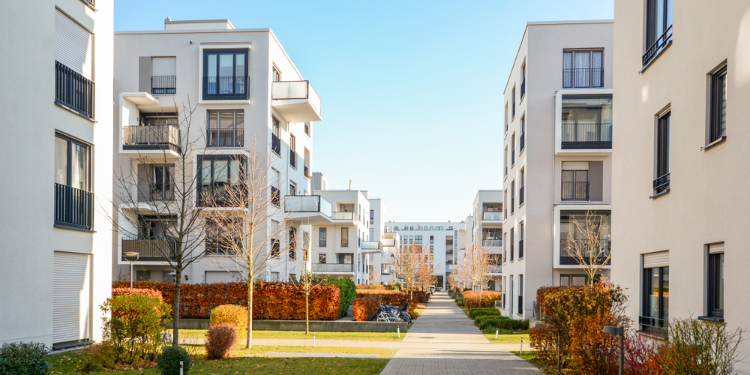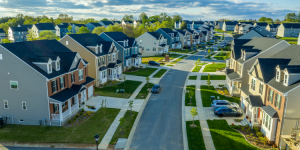
Property prices are soaring! The effect of these surging prices was already being felt before the health crisis and has since become more pronounced. While real estate is considered a strong safe haven, especially in times of crisis, all indicators are in the red. The situation is particularly critical in China and is tending to cause havoc in other markets around the world, in North America, Europe, North Africa and Asia. Between overheating and running out of steam, the real estate crisis is sending contradictory signals to the entire business world. Let's decrypt the situation in some of these countries affected by the real estate crisis.
Are we heading for a global real estate bubble?
Millions of renters and first-time buyers worldwide increasingly feel that home ownership has become an elusive dream. Mortgages are becoming more expensive than ever, and banks are being more selective in screening applicants. The housing market is, by nature, interest rate sensitive. Low rates favor loans and stimulate purchases. But they can also lead to higher house prices, especially when demand exceeds supply and speculation is rife. Rising interest rates make things more challenging for thousands of households. Many countries are currently affected by these interest rate hikes.
Many Central Banks have been raising their key interest rates lately. In early October, the New Zealand Central Bank raised its rates for the 8th time in barely a year. The US Federal Reserve, the South African Central Bank, the Canadian Central Bank, the BAM (Moroccan Central Bank) and the European Central Bank have all raised their interest rates. The Bank of Japan is one of the few to keep interest rates low, defying the global trend. The world's third-largest economy is banking on stimulating demand and hopes to keep inflation at 3%. A low level compared to other countries but a historic one for the archipelago. The yen is falling against the dollar (1 dollar is worth almost 150 yen), and the country is drawing on its foreign exchange reserves to stabilize the currency. Japanese export companies anticipate a recession in Europe and the United States, but those who import, especially raw materials for housing construction, are suffering the effects of the crisis.
Increasingly expensive properties
Even if housing units are readily available, who will be able to buy them? In Japan, property prices have been rising steadily since the 2010s. They have been soaring since the Covid pandemic. But many Japanese people can no longer afford to buy either old or new properties. In Portugal, property speculation is hitting precarious households. The country of digital nomadism and the golden visa (which risks being canceled) is constantly attracting foreigners with incomes far higher than locals, forcing up housing prices. Lisbon is saturated. Many inhabitants are forced to leave their homes.
In neighboring Spain, too, the property market is overheating. Barely 14 years after the previous real estate crash, a consequence of the US subprime crisis, Spain is once again in a real estate bubble. According to the General Council of Notaries, prices rose by around 5.1% in 2021, with peaks in the tourist cities namely at 7.1% in Madrid, 7.9% in the Canary Islands, 8.1% in Andalusia and 14.2% in the Balearic Islands. If the real estate euphoria does not worry Spaniards for now (buyers are buying, sellers are selling, and the market is dynamic), it calls for the greatest of caution. Elsewhere, prudence is giving way to extreme vigilance. Some countries are in the red, like China.
Let's take a peek on 4 countries where real estate crisis is raging
China
Should we be worried about the real estate crisis in China? The Chinese real estate sector has been a pillar of the country's economy for years. It accounts for more than a quarter of China's GDP. The fall of the-then China's number one property company, Evergrande, in 2021, sounded like a warning. Whereas it was considered the emblem of China's real estate power, it is now the symbol of the country's property development crisis. The company stands with an estimated colossal debt of around 300 billion dollars and has further triggered the fall of its subsidiary in 2022 when the latter was summoned to pay back 1.3 billion USD. In its collapse, Evergrande dragged along even more of its subsidiaries and other smaller developers. Overwhelmed by abysmal debts, Chinese real estate companies are no longer able to fulfill their contracts. Construction sites have come to a standstill for months and even years in some cases, leaving builders and material producers weakened and buyers abandoned to their fate. Collateral victims are hence sucked into the downfall of the real estate sector.
The fightback is being organized by aggrieved buyers, many of whom have taken on debt to buy a home. About 1 million of them are refusing to pay off their mortgages until their homes are completed. Demonstrations, which are rare and often repressed in China, are being organized, reflecting the magnitude of the crisis. Desperate and indebted, some owners resign themselves to living in unfinished housing. Up to now, local authorities have remained deaf to their appeals. Construction workers are also in despair. They are forced to quit their jobs due to the failure of their employer to pay them. And no help or support is coming their way from the authorities in the wake of a crisis that is deeply impacting the country's entire economy. What is Xi Jinping doing? After years of euphoria, with the race to provide property loans to developers and buyers (starting with the 1998 housing reform), the market has gone into meltdown. When Beijing intervened in 2021 to tighten the conditions of access to credit, it was already too late. Developers, strangled by debt, were dragging all the other economic players down with them. To stop the downward spiral and, above all, to avoid losing the confidence of investors and buyers, Beijing is planning to provide more than 150 billion euros in loans to clean up the finances of failing developers. But still! No one is sure that this will be enough to stem the crisis.
Morocco
The Covid pandemic has also made things worse for the Moroccan real estate sector, which has been in crisis for several years. The war in Ukraine is another hard blow for construction companies, which cannot keep up with the rise in the price of raw materials. Last April, Anice Benjelloun, vice-president of the National Federation of Property Developers (FNPI), quoted by L'Observateur du Maroc et d'Afrique magazine, analyzed the extent of the problem: "Real estate is going badly. Very badly. There has been a clear slowdown in activity and even a halt to several building sites because of not only the vertiginous increase in prices observed on the market for more than a year but also, above all, the shortage of certain construction materials such as electrical wires, glass, amongst others."
Soaring material prices resulted in additional production costs ranging between 20% and more than 30%. These additional costs are passed on to developers and buyers. The snowball effect is growing in such a way that it is suffocating an entire sector. Should developers increase their prices at the risk of penalizing individuals who are already overburdened by the crisis? What to do for those who cannot pay? According to the Al-Maghrib bank, the sectoral index of real estate fell by 23% in March 2022. A situation that still persists, despite the government's involvement. To relieve the construction companies, the government implemented a package of measures, including price indexes applied to construction contracts and the revision of deadlines for the execution of works. This aid is vague and only concerns the public sector, while the majority of promoters work in the private sector.
To revive the economy, Fatima Ezzahra El Mansouri, Minister of National Land Use Planning, Urban Development, Housing and Urban Policy, intends to launch a vast housing program for the middle and modest classes. This is precisely the kind of in-depth market overhaul the developers and real estate professionals are asking for since the property market is overheating, despite a slight 2.9% fall in prices in the first quarter of 2022. However, the players on the ground do not see any improvement and are calling for a relaxation of the legislation that could allow them to house more people in a building (by adding a floor in areas limited to a specific number of floors, for example). While waiting for some soothing effects of this stimulus package, real estate professionals are under no illusion that 2022 is still a year of crisis.
France
Crisis or not, in France, the professionals of the sector keep on parleying. Some are warning about the risk of collapse of the real estate sector, while others are talking about a simple slowdown in 2022. Some others are even considering 2022 to be a good year, with 1.1 million real estate transactions completed. However, the price increase is a reality, with +5.6% on average over one year.
Households are seeing their dream of becoming homeowners one day slipping further and further away. Inflation is exacerbating the disparities between individuals, drawing the least solvent down economic drains. Among them are many first-time buyers, who represent around 60% of buyers of both old and new homes. First-time investors face similar difficulties; they are stifled by debts that they struggle to repay. We often forget that investors are not always large groups. There are also many private individuals who have entered the property market, which they considered a safe haven, especially in times of crisis. Unfortunately, inflation has added an unforeseen burden on their shoulders.
But for the senior director of the French Observatory of Economic Conjunctures (OFCE), Xavier Timbeau, the major risk lies elsewhere: "The impact of the economic and energy crisis on real estate will be minimal, compared to the direct effect of the rise in lending rates." On September 28, the Banque de France announced that the maximum legal rate for home loans would rise from 2.57% to 3.05% for a loan of 20 years or more. The measure has been effective since October 1st, but it comes as false good news. The banks that give out loans at higher rates every day are themselves increasing their own rates. Ultimately, it is the borrower who foots the bill. And while the law still sets the maximum debt ratio at 35% for property loans, with the same budget, home buyers are today purchasing properties that are about 15% smaller than in 2021. Rising interest rates are squeezing household budgets and postponing their purchase plans. Does this mean that France is in a property bubble? Experts are still wondering! But one thing remains: The number of real estate transactions is expected to decline in 2023.
Canada
Is the Canadian housing bubble bursting? The Bank of Canada has raised its key interest rates on several occasions, leading to a drop in property prices, which in turn has led to a decline in the number of property transactions. Will this be enough to stem the crisis? According to the Swiss bank USB, Toronto could be the first city "at risk" of the housing bubble bursting. Vancouver comes in 6th. The government prefers to remain optimistic. Quebec Finance Minister Eric Girard last June, quoted by Radio-Canada, stated: " New construction sites are up by 50% compared to the average of the last 10 years. We have programs for social housing, affordable housing, and rent supplements." But the government also recognizes that the situation of indebted households is worsening. In 1999, 6.5% of households had debts exceeding 350% of their income. By 2021, this percentage had risen to 18.7%. The Covid pandemic has made the situation even worse, with many households taking on debt to buy property. According to the Bank of Canada: "a growing share of households have put themselves in a precarious financial situation to buy a property in a context of high housing prices. This precariousness of households has increased with inflation. "
In Canada, the average price of a home has surged by 50% since 2019. It has been decreasing since this year and should continue to do so in 2023, with a drop in prices estimated at around 15%. But the question is how to stimulate demand. The Bank of Canada warns that the number of indebted and over-indebted households is increasing. While the number of housing offers and demands seems to be finally coming together in some regions, many homes remain unaffordable for many people.



















